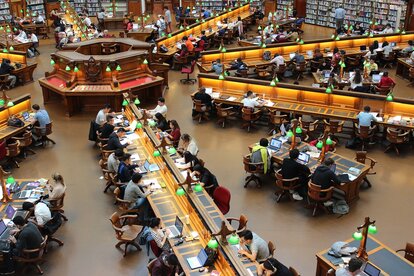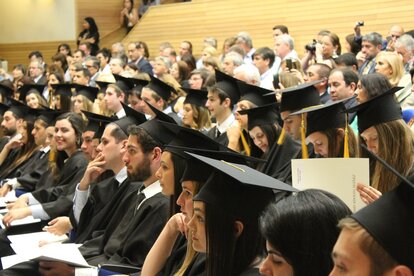Youth
Student Mobility, a Key to Turn the Mediterranean into a Cradle of Leadership

Something is moving in the Mediterranean region. The new generations, born between 1980 and 2005, shaped by economic and social crises in an increasingly complex and fragmented geographical area, and afflicted by a precariousness that conditions their emancipation and way of life, understand training as a necessary tool to make a virtue out of necessity, successfully face the great challenges of their time and take advantage of the opportunities they entail. Training that, seasoned with efficient and effective student mobility, could further sharpen the skills of these leaders of tomorrow.
In line with their optimism when they think of the future, these generations see education and training as their great hope for prospering in their personal and professional careers, and for achieving a fairer, more dignified and better life. They believe it is capable of creating wealth and equal opportunities. They see it as the ultimate weapon to overcome ignorance and prejudice, and to lay a solid foundation for mutual understanding and peaceful, civilized and fraternal coexistence among people and nations in the Mediterranean area.
This is the spirit that encouraged the II Mediterranean Student Summit, held in September this year at the Abdelmalek Essaadi University in Morocco, at the initiative of the Union of Mediterranean Universities (UNIMED) and the Erasmus Student Network (ESN), and designed to make students spokespersons for the area, determined to bring their thoughts, ideas and proposals to those who design academic cooperation in the Euro-Mediterranean region.

Among these bodies is the Union for the Mediterranean, which brings together 43 countries - all those of the European Union, the Mediterranean Arabs and Israel - and continues the legacy of the Barcelona Process with the aim of turning the Mediterranean region into a common space of peace, stability, prosperity and security. Higher education institutions emerge as essential actors in this process, impossible without their interest in establishing synergies, exchanging best practices and implementing regional projects aimed at stability, human development and integration. Its Member States have already approved more than 50 projects in a wide range of fields, including student mobility in the region, the problems of which are addressed in the report "The Internationalisation of Higher Education in the Mediterranean. Current and Prospective Trends", carried out by UNIMED, which recalls that the internationalization of higher education systems goes beyond mere academic mobility by involving the integration of an intercultural and global dimension in teaching methods and governance, and addresses cross-border educational trends with special emphasis on academic exchange.
Student mobility is a core issue among the interests of the younger generations, who consider programs such as Erasmus+ as a huge success story, with its pros, such as new and effective inclusion measures, and cons, still to be worked on and improved, such as administrative and bureaucratic difficulties or the low participation of international students in local community activities. This can be deduced from the report published this year under the title 'The Student Perspective to the Erasmus+ 2021-2027 Mid-term Evaluation', which evaluates the evolution of this international mobility program of the European Union open to all countries of the world.
The report 'The Student Perspective to the Erasmus+ 2021-2027 Mid-term Evaluation' was among the issues that brought together in November this year, at the University of Alicante, Spain, more than fifty directors from eleven countries, from Erasmus+ national agencies in the Mediterranean, who considered it essential to increase cooperation between universities in the Mediterranean basin, and focused on establishing a joint program of international studies involving students from the countries of North Africa and the Maghreb area.

Although the number of internationally mobile students in higher education has grown dramatically, from 300,000 in 1963 to 2 million in 2000 and up to 6 million in 2019, this figure represents only 2.6% of the total global student population, according to the report "Minds on the move: opportunities and challenges for virtual student mobility in a post-pandemic world", published by the UNESCO International Institute for Higher Education in Latin America and the Caribbean (IESALC).
Therefore, much remains to be done. And the effort is worthwhile, since student exchange and mobility initiatives, which hinge on values such as generosity, tolerance and understanding, represent, for those who benefit from them, a profitable and rich exchange of ideas and principles, of cultural and spiritual heritage. And for the Mediterranean Region and its societies, they represent a factory of leaders with an empathetic and open mind to the world, to the different collectivities and cultures with their different facets, with a willingness to profess a solidarity worthy of being loved, as Seneca would affirm in his 'Moral Epistles to Lucilius': a real and effective solidarity when imagining and making possible a day to day life in peace and dignity, which guarantees an equitable and sustainable development, welfare and quality of life.
And so, a boost to student mobility that transcends physical and knowledge borders would lead to the construction, in the Mediterranean region, of a new environment created on the awareness of shared values and rights, of fraternity among the peoples of the area.
It is a goal that seems, in this world of dizzying technological advances, a little closer thanks to the advantages of virtual student mobility (EVM), which can be complemented by face-to-face mobility. As the report "Minds on the move: opportunities and challenges for virtual student mobility (EVM) in a post-pandemic world", prepared by UNESCO's IESALC, explains, EVM opens up new, more inclusive and sustainable possibilities for democratizing access to international exchanges. To understand, as Octavio Paz would say when receiving his Princess of Asturias Award, that "the sciences have no homeland or, more precisely, their homeland is human understanding".
